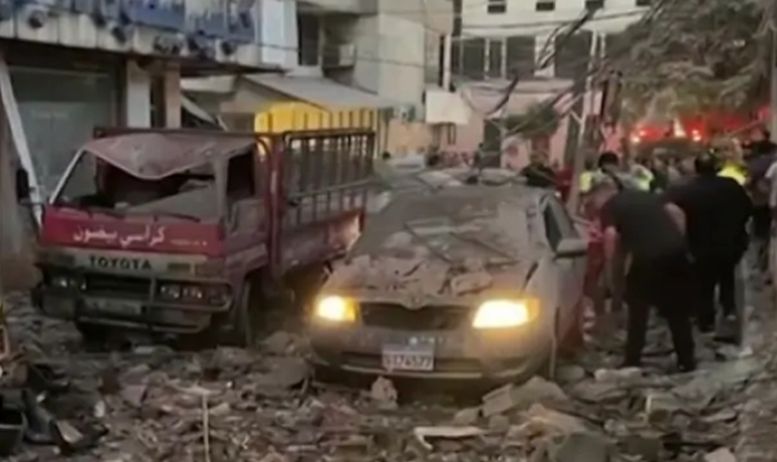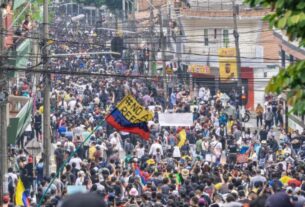Demonstrative Assassinations Deepen and Expand the Bloodbath
The provocative assassinations by the right-wing Israeli government in the last 24 hours have aggressively swung the regional pendulum from the possibility of a ceasefire agreement in Gaza, towards a wide-scale “multi-front” escalation in the direction of regional war. The danger inherent in this development and its destructive consequences cannot be overstated.
Prime Minister Netanyahu, Defense Minister Gallant, Chief of Staff Herzi Halevi, and the heads of the Israeli military are ready to spill more rivers of blood and push the entire Middle East to the brink of regional war in a desperate search for an “image of victory” on the 300th day of the bloody crisis that broke out on October 7, and the genocidal attack by Israeli capitalism on the Gaza Strip, where none of the official war goals (“toppling Hamas” and the return of all Israeli hostages) have been achieved. The latest provocative assassinations were carried out with a conscious and cynical risk to the lives of residents throughout the region: in Lebanon, Syria, Iran, Yemen, the occupied Palestinian territories, and Israel.
The assassination of Hamas political bureau head Ismail Haniyeh in Tehran occurred just hours after the assassination of Fuad Shuker (Haj Mohsein), a senior Hezbollah member, in Beirut by an Israeli airstrike that also killed five residents, including children, and injured over 85 others. These assassinations are a direct continuation of the demonstrative bombing of civilian infrastructure in the port of Hodeidah in Yemen on July 20 and the attempted assassination of Mohammed Deif on July 13 in the Al-Mawasi area of the Gaza Strip, part of a massacre that killed at least 90 displaced Palestinians.
The Israeli army spokesman tried to link the assassination of the senior Hezbollah official in Beirut to the disaster in Majdal Shams, a village in the annexed Golan Heights where 12 children and teenagers on a football field were killed by rockets fired from Lebanon. The demonstrative assassinations planned by the army chiefs and the Israeli right-wing government were not intended to protect the children of Majdal Shams. They are the same people responsible for the mass slaughter of Gaza’s children, which is now called a “children’s graveyard,” with estimates of those killed by the Israeli military reaching a horrifying 15,000. Over 40,000 Palestinians have perished so far in the historic massacre in Gaza, and the number of injured is approaching 100,000. The full extent of the carnage is yet to be clarified, with epidemics — including polio and hepatitis — rampaging through the devastated strip. The policy of the Israeli right-wing government has brought ruin to Gaza through bombings, starvation, and the denial of basic services to millions of people. This inferno, like the assassination policy, cannot and was not intended to ensure personal security for Israelis.
Is the Israeli government pushing for direct military confrontation with Iran?
Army and government spokesmen hurried yesterday to take responsibility for the assassination in Beirut, although they have not yet officially taken responsibility for the assassination in Tehran. These are moves intended to score political points for Netanyahu and his government. The Prime Minister’s Office released photos of himself with uniformed personnel minutes after reports of the bombing in Beirut, Netanyahu hastened to organize a press conference. Thus, the murderous government seeks to rally the Israeli public, the majority of whom wish for its fall. However, the primary aim of these moves, from the perspective of the political and military arm of Israeli capitalism, which is in a deep geostrategic crisis without an “exit strategy” and a plan for the “day after,” is to send a clear message of readiness for regional war on multiple fronts and even a willingness to drag the Iranian regime into direct military confrontation.
It seems that at least some parts of the government and military top brass hope that this way, they will be able to once again garner political and military support from Washington within the dynamics of regional escalation, which influences and is influenced by the rivalry between superpowers from the West and East. Simultaneously with the statement by Russian Deputy Foreign Minister Mikhail Bogdanov that the assassination of Haniyeh is an “unacceptable political murder,” US Secretary of Defense Lloyd Austin promised military assistance to Israel in the event of escalation, while American warships are making their way to the shores of Lebanon. US Secretary of State Antony Blinken tried to distance himself from the assassination of Haniyeh, claiming that the White House was not informed and was not involved. Nevertheless, the Iranian Foreign Ministry clarified that it sees the US as responsible alongside Israel.
Haniyeh arrived in Iran to attend the inauguration ceremony of the new president, Masoud Pezeshkian. The arrogance of the assassination is boundless, as if seeking to push the Iranian regime from proxy action to direct military confrontation with Israel.
Pezeshkian’s deputy, Reza Arif, said that Tehran does not want further escalation in the Middle East following the assassination. However, the Iranian regime will find it difficult to remain silent. The supreme leader, Khamenei, threatened that “it is Iran’s duty to avenge Haniyeh’s blood because he died a martyr’s death on our soil,” and the Revolutionary Guards threatened a “harsh and painful response from the resistance front, especially Iran.” A member of the Houthi political bureau, Hazam al-Assad, also joined the threats: “There is coordination regarding the response. It will be comprehensive and much larger, commensurate with the magnitude of the event.” The assassination in the heart of Beirut is, by itself, without the assassination in Iran, a provocative step toward “changing the equation” by the Israeli right-wing government considering that during the current war, Hezbollah’s secretary-general has repeatedly stated that his organization would respond to an attack in Beirut by striking the Tel Aviv metropolitan area.
Assassination of efforts to reach a deal?
The provocative assassinations, similar to the assassination of Hamas leader Salah al-Arouri in Beirut last January, at least for now, have derailed the negotiations for a ceasefire agreement and prisoner exchange in the Gaza Strip. Already in recent weeks, Netanyahu and his government placed additional obstacles, amounting to an assassination of the deal. Now Netanyahu and Gallant have chosen to assassinate Haniyeh, considered a central figure in managing the negotiations and conveying messages between the Qatari government and the Hamas leadership in the strip.
Gallant’s statement, that even after the assassination “Israel is working to achieve a framework that will allow the return of the hostages,” was primarily intended to fend off pressures and paint a false picture as if the provocation he initiated was meant to advance a deal and ceasefire. Sharon Lipschitz, daughter of the hostage Oded, said following the assassination that “there is a targeted attempt by Mr. Abandonment, who heads the government, not to let the deal go through.” During the weeks in which the right-wing government worked to derail the deal, some of the hostages’ families repeatedly demanded that the head of the Histadrut (biggest trade union federation), war supporter Bar-David, lead a general strike in the economy. It is essential to increase the pressure on Bar-David and union leaders in the Histadrut and other unions to leverage the organized labor force in favor of an exchange deal, ceasefire, and rehabilitation.
The continuation of the military attack on Gaza and the occupation army’s entrenchment in the strip will not only derail a deal and prolongs the war crisis but will in fact deepen and expand it. The fact that the Middle East is closer today to regional war than at any other point in the last 300 days is one expression of this. Another expression of the depth of the crisis and its dangers was seen earlier this week with a show of force from right-wing extremists, with Knesset members and masked gunmen storming military bases unhindered to protect the horrific practices of torture and sexual abuse of Palestinian prisoners.
In the 1967 territories, a general strike was declared on July 31 in protest of the assassination of Haniyeh. In Jordan, thousands of young people demonstrated in front of the Israeli embassy in Amman, despite heavy police suppression. As more protests are organized in response to the assassination in the region and worldwide, they will primarily express sharp opposition to military aggression and the national oppression of Palestinians, which has reached a barbaric peak this year. However, this does not necessarily represent full or enthusiastic support for Haniyeh’s views and political path, Hamas, or the Iranian regime — which socialist forces oppose and which represent a dead end for the Palestinian struggle for national and social liberation.
This struggle is deeply linked to the necessary struggle by working people in the region to end the siege, occupation, and national oppression imposed on millions of Palestinians, to imperialist wars, and to the intervention of Western and Eastern super-powers relying on oligarchies in Israel and the region. Such a transformation can be possible, not under today’s capitalist system, but as part of a struggle for socialist change that guarantees democracy and personal security, based on equal rights for existence and self-determination. This would mean taking key resources into democratic public ownership to be put to use for the welfare of all, to eliminate inequality, poverty, housing distress and unemployment.
The fight for the lives and futures of ordinary residents throughout the region must continue to be built here and now, as millions across the Middle East, including in Israel, fear the expected escalation in the coming days. This deep fear only sharpens the urgent need to organize demonstrations, protest actions, and even coordinated strike measures across communities at the national and even regional level, with a clear call:
We Say:
- No to regional war! Stop the assassinations and demonstrative attacks.
- No to the invasion of Lebanon, stop the bloodbath in Gaza — withdraw all Israeli military forces from the strip, yes to the return of prisoners — “all for all.”
- Stop the attacks by the army and settlers in the West Bank.
- Yes to the rebuilding of Gaza, under the democratic control of the residents, and the rehabilitation of all affected communities.
- Yes to the fight for the establishment of an independent, democratic, socialist, and equal-rights Palestinian state, and the fight for democracy and socialist change in Israel and the region, ensuring equal rights for all nations and all minorities.



